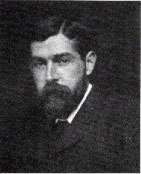Francis Herbert Bradley
1/30/1846- 9/18/1924)

Bradley was born on 30th January, 1846 in Clapham (then in the county of Surrey, since absorbed into a much expanded London). He was the fourth child and eldest surviving son of Charles Bradley, a prominent Evangelical preacher, and his second wife, Emma Linton. The family was talented and well connected: George Granville Bradley, a son from the first marriage, was successively Head Master of Marlborough College, Master of University College, Oxford, and Dean of Westminster Abbey; A.C. Bradley, a younger son from the second marriage, taught philosophy at Oxford until 1881, and, after moving to literary studies, held chairs at Liverpool and Glasgow, refused one at Cambridge, and became the most distinguished Shakespearean critic of his day. Charles Bradley's ‘Clapham Sect’ (as this actively evangelical humanitarian group was known at the time) had strong imperial connections, including among its members a Governor-General of Bengal, a Governor of Sierra Leone, several members of Parliament and a permanent head of the Colonial Office.
In 1856 F.H. Bradley's schooling began at Cheltenham College; in 1861 he was transferred to Marlborough College, then under his half-brother's Headship. While at Cheltenham he began learning German; he read at least some of Kant'sCritique of Pure Reason while still at school, though it is not clear that this was in the original language. In the winter of 1862-3 he contracted typhoid fever (at one stage expected to kill him), followed shortly by pneumonia. Surviving both, he was protected from further exposure to the rigours of English public school life by leaving Marlborough in 1863.
In 1865 Bradley entered University College, Oxford, as a Scholar, getting a first in classical moderations (Mods) in 1867 but only an unexpected second inliterae humaniores (Greats) in 1869. A.E. Taylor, a later admirer of Bradley and sympathetic to his idealism, attributed his reverse in Greats to ‘the complete incapacity of examiners whose philosophical scriptures were the writings of John Stuart Mill to comprehend what philosophy meant to the brilliant younger men who were shortly to revolutionize philosophical studies in Great Britain.’ Whether or not this is true, there is certainly an undisguised contempt for Mill and his followers exhibited in Bradley'sPrinciples of Logic. After more than one failure to obtain a college fellowship, he was in December 1870 elected to one at Merton College Oxford, tenable for life, with no teaching duties, and terminable only on marriage. He never married, and remained in his fellowship until his death.
In June 1871 Bradley suffered a severe inflammation of the kidneys which appears to have had permanent effects. It has been suggested, possibly with malice, that the Bradleys in general were disposed to hypochondria; be that as it may, he was prone thereafter to be incapacitated by cold, physical exhaustion or anxiety, and in consequence lived a retired life. He took an active part in the running of his college, but avoided public occasions, to the extent, for example, of declining an invitation to become a founding member of the British Academy. Collingwood records of Bradley in hisAutobiography, ‘[A]lthough I lived within a few hundred yards of him for sixteen years, I never to my knowledge set eyes on him.’ This relative seclusion added an element of mystery to his philosophical reputation, a mystery enhanced by the dedication of some of his books to a person identified only by the initials ‘E.R.’
But although Bradley devoted himself to philosophy, so that the history of his public life is largely that of his books and articles, it is clear that his was not a narrowly bookish existence. To protect his health, he frequently escaped the damp chill of Oxford winters for the kinder weather of southern English and Mediterranean seaside resorts. His metaphysics, a striking combination of the rational and the mystical, makes more than grudging room for the life of the senses and emotions, and his writings, especially his posthumously publishedAphorisms, could not be the work of a man whose experience had been confined to the study. He liked guns and disliked cats, indulging his preferences economically by using the former to shoot the latter in the college grounds at night.
Bradley's political views are said to have been conservative, though not of a narrowly doctrinaire kind. Although his writings reveal a religious temperament, he seems (judging by a letter of 1922) to have found the evangelical religiosity of his father's household oppressive, and, perhaps in consequence, the attitude to Christianity displayed later in his writings exhibits a certain ambivalence; on the whole, he appears to have been a freethinker. (To imagine growing up amongst the members of the Clapham Sect, we might use John Sutherland's suggestion that the characters of Edmund and Fanny in Jane Austen'sMansfield Park give us some idea of what they would have been like.)
Bradley's public recognition included the conferring of the honorary degree LL.D. by the University of Glasgow (1883), election to membership of the Royal Danish Academy (1921), of theAccademia dei Lincei and theReale Istituto Lombardo of Milan (1922), and election to an Honorary Fellowship of the British Academy (1923). In 1924, King George V bestowed on him, the first philosopher to be singled out for this very rare honour, the Order of Merit. Three months later, after a few days' illness, he died from blood poisoning on 18th September, 1924. He is buried in Holywell Cemetery, Oxford.
Taken from:
http://plato.stanford.edu/entries/bradley/ Also see:
http://www.swif.uniba.it/lei/foldop/foldoc.cgi?Bradley+Francis+Herbert